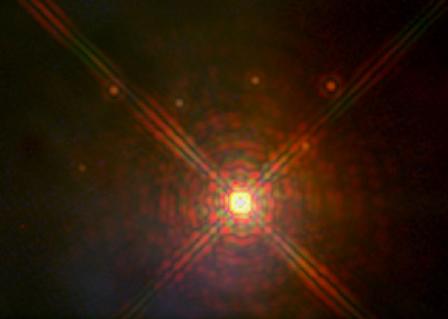
|
Credit & Copyright: R. Thompson, M. Rieke and G. Schneider
(Univ. Arizona),
NASA
Explanation:
The star cataloged as NGC2264 IRS is normally
hidden from the inquiring gaze of optical
telescopes.
It resides in the midst of the
obscuring gas and dust
of a nearby star forming region
popularly known as the Cone Nebula.
Imaged in penetrating infrared light by
the Hubble Space Telescope's
NICMOS instrument,
this young and massive star
was found to be surrounded by six "baby" sun-like stars -
all within less than a tenth of a light-year of their "big brother".
The diffraction spikes and rings surrounding big brother are
image artifacts.
Astronomers believe that the
high speed winds generated by the massive
star compressed nearby material causing the formation of the
smaller stars in a text book example
of triggered star formation.
The young suns appear to lie along an otherwise invisible boundary
where the high speed gas has collided with the wall of a denser
molecular cloud.
NGC2264 IRS also seems to be the source of the outflow which created
the striking
cone shape of the optical nebula.
|
January February March April May June July August September October November December |
| ||||||||||||||||||||||||||||||||||||||||||||||||
NASA Web Site Statements, Warnings, and Disclaimers
NASA Official: Jay Norris. Specific rights apply.
A service of: LHEA at NASA / GSFC
& Michigan Tech. U.
Based on Astronomy Picture
Of the Day
Publications with keywords: infrared - star formation - NGC 2264
Publications with words: infrared - star formation - NGC 2264
See also:
- NGC 1333: Stellar Nursery in Perseus
- APOD: 2026 January 18 Á Jupiter from the Webb Space Telescope
- APOD: 2025 December 28 Á NGC 1898: Globular Cluster in the Large Magellanic Cloud
- NGC 253: Dusty Island Universe
- Webb's Rho Ophiuchi
- APOD: 2025 October 21 Á IC 1805: The Heart Nebula
- Young Suns of NGC 7129
